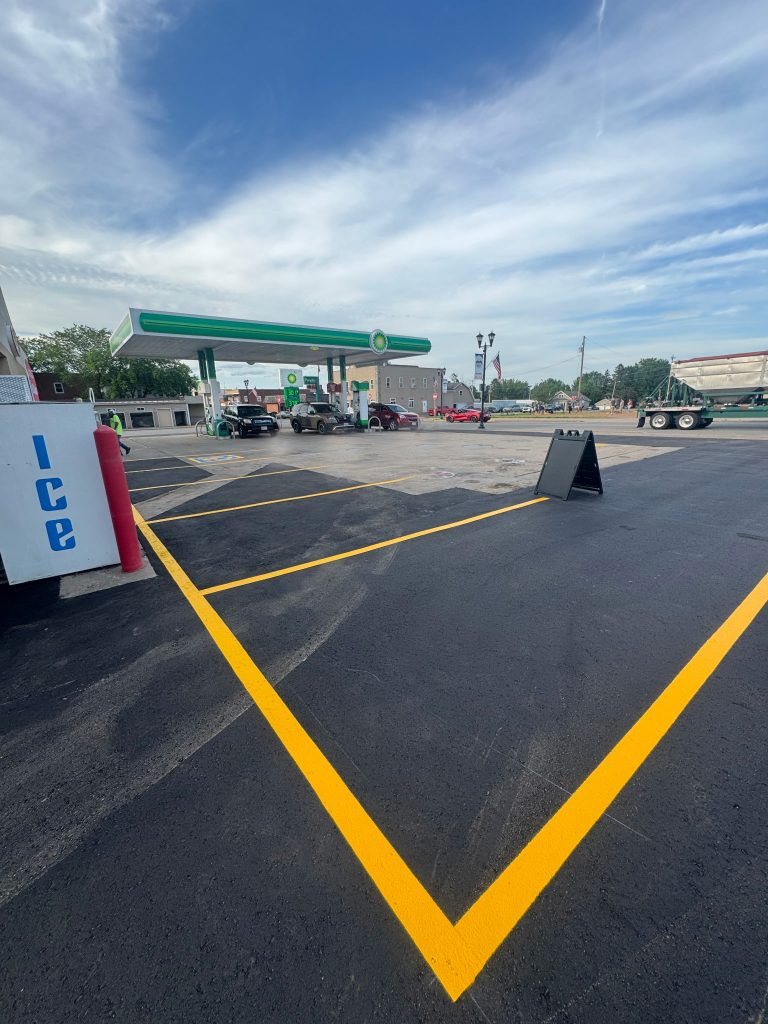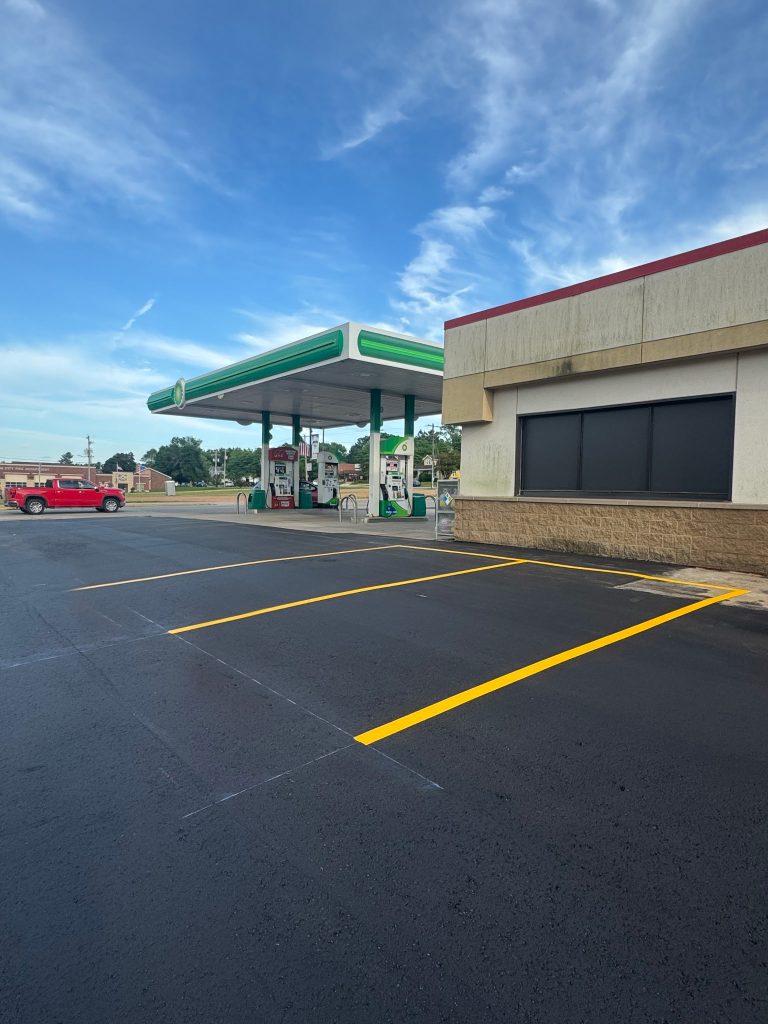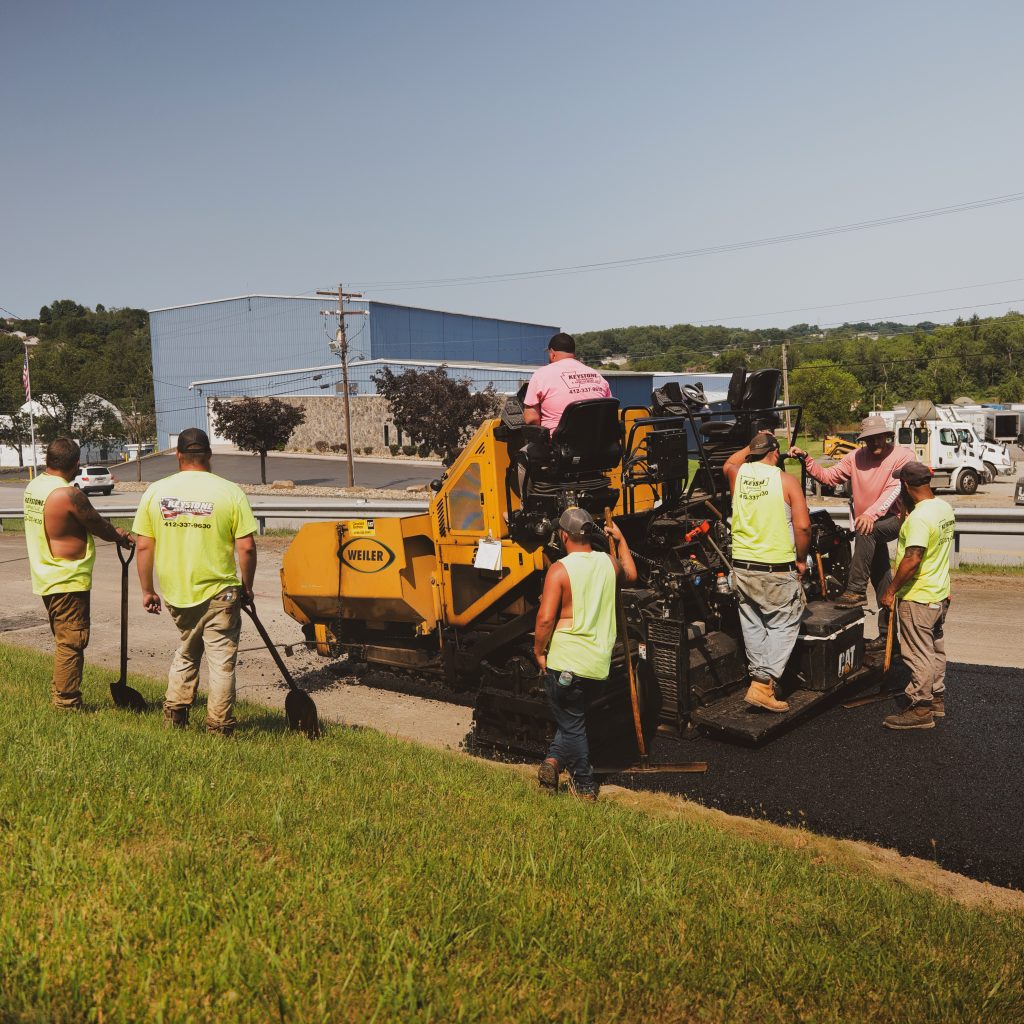Think about the last time you pulled into a business parking lot. Did you notice the faded lines, the cracks spreading like spider webs, or the potholes you had to dodge? Chances are you did, because the parking lot is the very first handshake a building has with its visitors. Long before anyone sees the lobby or shakes hands with your team, they’re judging the professionalism of your business based on that asphalt. That’s why parking lot paving isn’t just about laying down asphalt. It’s about reputation, safety, and the long-term success of your office building.
At The Pavement Group, we’ve worked with countless office buildings, medical centers, and commercial properties across the country. What we’ve seen again and again is that a smooth, well-maintained parking lot doesn’t just make people feel welcome. It protects property value, lowers liability risks, and shows that you’re serious about the details.
The Connection Between Pavement and Business Success
Most people think of their parking lot as a utility. A place to park cars. But the truth is it’s so much more. For property managers in Pittsburgh, Nashville, or any major city where The Pavement Group operates, the parking lot becomes part of the brand experience. If clients, tenants, or employees encounter cracks, potholes, or poorly marked spaces, it subconsciously lowers their perception of the entire building.
Safety Should Never Be an Afterthought
Here’s the part that many office building owners underestimate. A damaged parking lot is a safety hazard. Trip-and-fall accidents, vehicle damage, or even drainage issues after a heavy rain can all lead to lawsuits. Parking lot paving done right reduces those risks. When you partner with professionals who understand local regulations and ADA compliance, you’re protecting your tenants and your investment.
The ROI of Parking Lot Paving
Now let’s talk numbers. A properly paved and maintained parking lot saves money in the long run. When cracks are sealed early and resurfacing is done on schedule, you avoid full-depth replacements that can cost hundreds of thousands. The Pavement Group specializes in preventative maintenance strategies that stretch your budget further while keeping your office property in top shape.
Why Location Matters
Parking lots don’t age the same way everywhere. In colder climates like Pittsburgh, freeze-thaw cycles cause asphalt to expand and crack. In southern regions like Nashville, constant heat and heavy rainfall wear pavement differently. That’s why you need a team that understands local soil conditions, weather impacts, and state codes.
At The Pavement Group, our crews tailor paving solutions to local conditions so your parking lot lasts longer. We know the difference between paving a medical plaza in Pennsylvania and an office complex in Tennessee. That expertise means fewer surprises, fewer repairs, and more reliable results.
Testimonial
“When we first contacted The Pavement Group about our office complex in Cranberry Township, our lot looked terrible. We had potholes, water pooling in low spots, and tenants complaining constantly. Their team didn’t just repave the surface. They analyzed drainage issues, laid out a maintenance plan, and delivered a result that completely changed the property’s image. Now tenants compliment the lot and our property value has gone up. I couldn’t recommend them enough.” – Mark R., Property Manager in Western Pennsylvania
The Step-By-Step Process of Parking Lot Paving
Step 1: Inspection and Assessment
Every paving project starts with a full inspection. We look at drainage, sub-base stability, crack patterns, and safety hazards. This helps us determine whether you need patching, resurfacing, or full-depth reconstruction.
Step 2: Site Preparation
Preparation is where quality begins. Crews clear debris, mill deteriorated sections, and stabilize the base. Without this step, no amount of asphalt can perform long-term.
Step 3: Paving and Compaction
High-quality asphalt is applied in layers and compacted for strength. The Pavement Group uses advanced equipment to ensure consistency and durability.
Step 4: Striping and Marking
A parking lot isn’t finished until it’s functional. We apply fresh striping, ADA-compliant markings, and directional signage. This improves flow, maximizes space, and boosts safety.
Step 5: Ongoing Maintenance
We don’t disappear after the last roller leaves the site. Our team offers sealcoating, crack filling, and periodic inspections to extend pavement life.
Why The Pavement Group Is the Expert You Need
There’s no shortage of paving contractors out there, but here’s what sets The Pavement Group apart:
- National Reach with Local Expertise: We service properties across the U.S. but bring local knowledge to every job.
- Cutting-Edge Technology: Our project management software keeps clients updated in real time.
- Preventative Approach: We focus on long-term savings, not quick fixes.
- Dedicated Customer Service: From small office lots to massive corporate campuses, we treat every project like it’s our own property.
Cracked Parking Lot? Don’t Wait!
If your office parking lot is cracked, faded, or unsafe, it’s time to act. Don’t let first impressions slip away or put your tenants at risk. Call The Pavement Group today for a free consultation and site assessment. We’ll create a paving plan that protects your investment, boosts curb appeal, and positions your office building for long-term success.
Frequently Asked Questions
1. How often should I repave my office building parking lot?
Most parking lots need repaving every 15 to 20 years depending on traffic and climate conditions. Regular maintenance like sealcoating and crack filling can extend that timeline. An inspection from The Pavement Group helps determine the right schedule for your property.
2. What’s the difference between resurfacing and full repaving?
Resurfacing adds a new layer of asphalt over the existing surface, while full repaving involves removing the old pavement and rebuilding from the base up. Resurfacing is more cost-effective if the base is stable. Full repaving is necessary when structural damage is widespread.
3. How does weather in my city affect my parking lot?
Cold climates with freeze-thaw cycles cause cracks and potholes quickly. Hotter regions see asphalt soften and degrade under UV exposure. Localized expertise from The Pavement Group ensures the right materials and techniques are used for your area.
4. Why is drainage important in parking lot paving?
Poor drainage causes water pooling which accelerates pavement breakdown. It also increases liability risks from slips and falls. A proper paving plan includes grading and drainage solutions to protect your lot.
5. How can paving improve property value?
A smooth, well-marked lot increases curb appeal and tenant satisfaction. It signals professionalism to clients and employees. Properties with well-maintained lots often appraise higher and lease faster.
6. What materials are best for office building parking lots?
Asphalt is the most common because it’s durable, cost-effective, and repairable. Concrete may be used in certain applications but is more expensive. The Pavement Group helps property managers choose the best solution for their budget and needs.
7. How do I know if my parking lot needs maintenance?
Signs include cracks, potholes, standing water, or faded striping. Small issues should be addressed quickly to prevent larger repairs. Our team offers free assessments to catch problems early.
8. What’s included in a parking lot maintenance plan?
Maintenance plans often include sealcoating, crack filling, patching, and line repainting. Scheduling these services regularly extends pavement life and reduces costs. The Pavement Group customizes plans to each property.
9. Is parking lot paving disruptive to tenants?
With proper planning, disruption can be minimized. Our crews schedule work in phases, provide clear signage, and maintain safe access. Communication is key and we keep tenants informed at every step.
10. Why is safety a key consideration in parking lots?
Safety is a key consideration because a well-maintained parking lot prevents accidents, reduces liability, and protects tenants and visitors.


